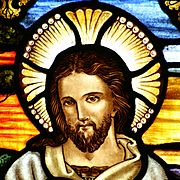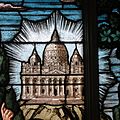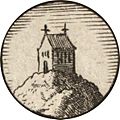Ecclesiology facts for kids
In Christian theology, ecclesiology is the study of the Church. It's about understanding what the Church is, what its purpose is, and how it works as a community.
This study looks at many things, like:
- The Church's role in salvation (how people are saved).
- Where the Church came from.
- Its connection to Jesus Christ.
- How it is organized and led.
- What its future holds (this is called Eschatology).
Ecclesiology can also mean the specific beliefs a certain church or Christian group has about itself. For example, you might hear about Roman Catholic ecclesiology or Lutheran ecclesiology. This means how the Catholic Church or the Lutheran Church sees itself and its mission.
Big Questions About the Church
Ecclesiology tries to answer some really important questions about the Church:
Who is the Church?
Is the Church a physical building or a specific organization, like a certain Christian group or denomination? Or is it all Christians everywhere, no matter what group they belong to? Do Christians who are alive today and Christians who have passed away (like the "cloud of witnesses" mentioned in the Epistle to the Hebrews 12:1) all make up the Church together?
Do You Have to Join a Church?
Is it important to be part of a church community and worship together? Is it necessary for a person's spiritual life? Can someone find salvation without being a formal member of a church? What does "membership" even mean? Is it Baptism? Agreeing to a creed (a statement of beliefs)? Or regularly taking part in church activities?
What is the Church's Authority?
Who gets to explain what the Church believes? Does the Church's structure itself, or its leaders, have a special way of receiving revelation from God or sharing God's grace?
What Does the Church Do?
What are the sacraments (like Baptism or Eucharist), special rules, and worship services within the Church? Are these things part of the Church's main job to share the Gospel (the good news about Jesus)?
How Should the Church Be Led?
What was the job and power of the Apostles (Jesus's first followers)? Is their authority passed down through the Church's leaders today? How should clergy (church leaders) like bishops and priests be chosen? What is their role in the Church?
What About Spiritual Gifts?
What part do 'spiritual gifts' (special abilities given by God) play in the life of the Church?
Church's Destiny
What is the final future of the Church, according to Christian eschatology (the study of end times)?
Related Topics
Core Beliefs of the Church
- Body of Christ: This idea describes the Church as the spiritual body of Jesus Christ.
- Biblical canon: The collection of books accepted as holy scripture by the Church.
- Creed: A formal statement of Christian beliefs.
- Orthodoxy: Correct belief or practice, especially in religion.
- Theology: The study of God and religious beliefs. This includes:
* Pneumatology: Beliefs about the Holy Spirit. * Christology: Beliefs about Jesus being the Messiah. * Soteriology: Beliefs about how people are saved.
Church Rituals and Practices
- Liturgy: The official public worship of the Church.
- Sermon: A talk given by a member of the clergy, usually based on a passage from the Bible.
- Sacrament: A religious ceremony or act that is considered to be a sign or means of divine grace.
* Eucharist: Also known as Holy Communion, a Christian ceremony remembering the Last Supper. * Baptism: A Christian rite of admission and adoption, usually with water. * Infant baptism: Baptizing babies. * Believers Baptism: Baptizing people who are old enough to choose to believe. * Confirmation (Christianity): A rite of passage in which a baptized person affirms Christian belief. * Chrismation: A sacrament in Eastern Christianity, similar to confirmation. * Holy Orders: The sacrament through which men are ordained as deacons, priests, or bishops.
How Churches are Governed
- Apostolic succession: The belief that bishops and priests get their authority directly from the Twelve Apostles through a continuous line of ordinations. This is important for Catholics, Eastern Orthodox, and Anglicanism.
- Canon Law: The set of rules and laws made by Christian authorities for the government of a Christian organization or church.
- One Holy Catholic and Apostolic Church: A phrase from the Nicene Creed describing the Church.
- Separation of church and state: The idea that the government and religious organizations should be separate.
- Clergy: People who are officially trained and appointed for religious duties in the Christian Church. This includes:
* Pope: The head of the Catholic Church. * Bishop: A senior member of the Christian clergy, usually in charge of a diocese (a church district). * Priest: An ordained minister of a church. * Deacon: An ordained minister ranking below a priest. * Pastor: A minister in charge of a Christian church or congregation. * Priesthood of all believers: The Protestant Christian doctrine that all baptized Christians are priests.
Images for kids
-
This stained-glass window shows St. Peter's Basilica in Rome. It represents the idea that the Church was built on the Apostle Peter, as mentioned in Matthew 16:18. Many Catholics believe that the popes who followed Peter continue this leadership.
-
This old picture from the 1600s shows a part of the Augsburg Confession. It says that "one holy Church is to continue forever" and that the Church is "the congregation of saints, in which the Gospel is rightly taught and the Sacraments are rightly administered." Here, the "rock" from Matthew 16:18 is seen as the teaching of Jesus Christ.
See also
 In Spanish: Eclesiología para niños
In Spanish: Eclesiología para niños
 | Dorothy Vaughan |
 | Charles Henry Turner |
 | Hildrus Poindexter |
 | Henry Cecil McBay |




